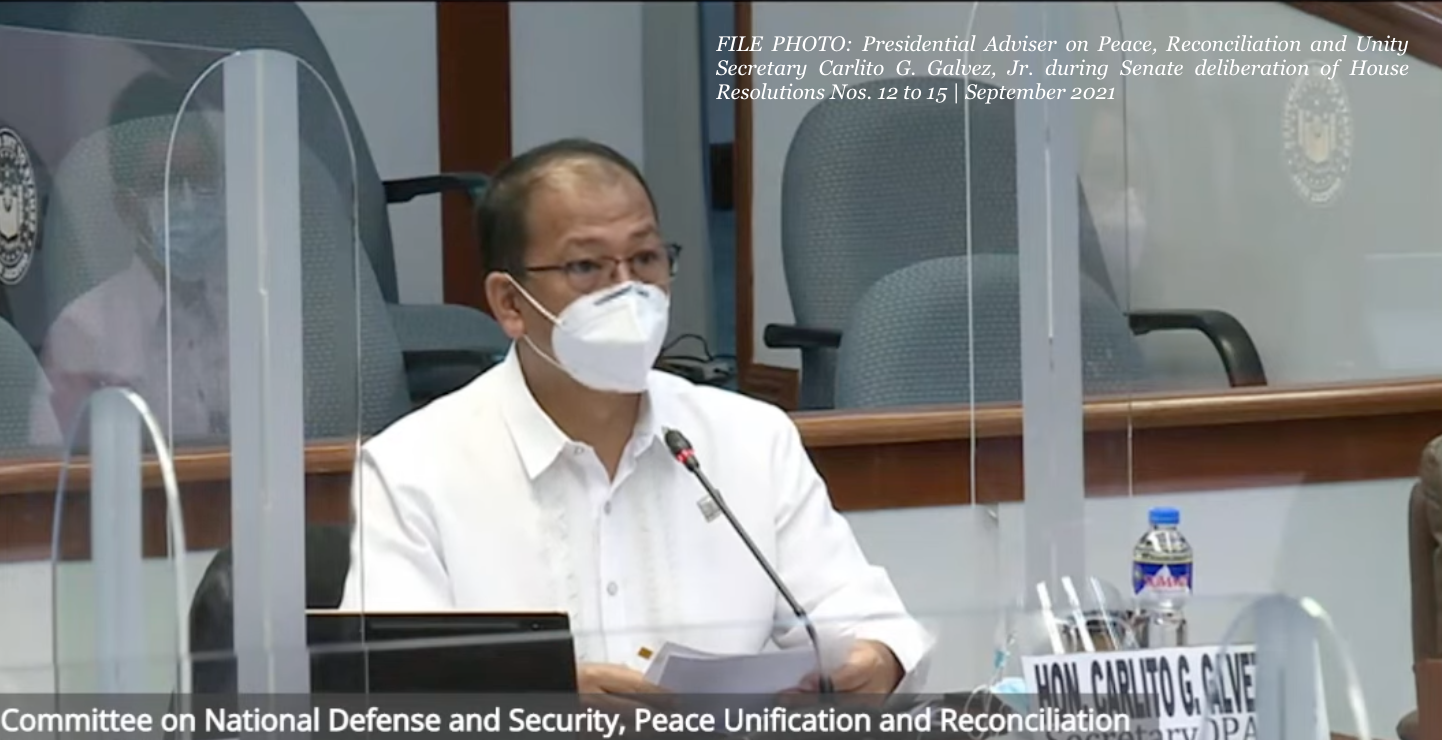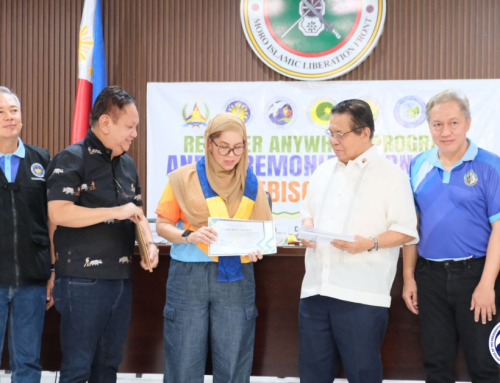PASIG CITY (26 JANUARY 2022) — Office of the Presidential Adviser on Peace, Reconciliation and Unity (OPAPRU) Secretary Carlito G. Galvez, Jr. welcomed the Senate of the Philippines’ adoption of House Concurrent Resolutions Nos. 12, 13, and 14 granting amnesty to members of the Moro Islamic Liberation Front (MILF), Moro National Liberation Front (MNLF), and the Rebolusyonaryong Partido ng Manggagawa ng Pilipinas/Revolutionary Proletarian Army/Alex Boncayao Brigade (RPMP-RPA-ABB), respectively, as he also urged the legislative body to provide its concurrence to Presidential Proclamation 1093, which grants amnesty to members of the Communist Terrorist Group (CTG).
“We welcome the decision of the Senate to concur with the proclamations granting amnesty to deserving members of these groups. It will allow them to put the past behind them, and give them and their families the opportunity to make the full transition to peaceful and productive civilian life as their social and political rights are restored along with the granting of amnesty” Galvez said.
“We also respectfully urge the Senate to also concur with Proclamation 1093 to allow the more than 24,000 regular and affiliated members of the CTG who returned to the fold of the law to apply for amnesty. As with the other revolutionary groups who have been given the chance to avail of the amnesty program, members of the CTG should also be given the same opportunity,” he pointed out.
“For it is by including the CTG in our amnesty program that we would be able to encourage them to turn away from armed violence and start a new life, and at the same time, allowing us to achieve our collective vision of bringing a just and lasting peace to all Filipinos,” Galvez added.
The Senate adopted three of the four the Lower House’s Concurrent Resolutions Nos. 12, 13, and 14 on Monday, January 24, without amendments from the 18 Senators who voted in favor of the said resolutions. However, it did not concur with Proclamation 1093 that could have provided the same amnesty to members of the CTG.
President Rodrigo Roa Duterte issued Presidential Proclamation Nos. 1090, 1091, 1092, and 1093 in February 2021 that grants amnesty to the rebel groups, and in line with Executive Order 125 that created the National Amnesty Commission (NAC).
“These measures bring us a step closer to our collective vision of creating the conditions where genuine peace and sustainable development can firmly take root and flourish under a just, humane and democratic society,” Galvez said.
Second chance to rebuild lives
National Defense and Security, Peace, Unification, and Reconciliation Committee Chair Senator Panfilo Lacson said during his sponsorship speech on Monday that through the amnesty grants, “we are handing out second chances to the over 7,600 prospective applicants who are willing to have a new start in life in a secure place in society.”
“To say that this is an ‘act of compassion’ may not be enough without emphasizing what it truly stands for, that is an act of mercy not only for those who will be granted amnesty but also for those who seek a true and lasting national peace and reconciliation,” Lacson said.
Galvez also called upon the members of the former rebel groups to take advantage of the amnesty program, and use it as an opportunity to help sustain the gains of peace.
“To the members of the former rebel groups who are now working with the Government of the Philippines (GPH) through the various peace mechanisms, may the granting of amnesty further inspire and embolden us in our journey towards a just and lasting peace,” Galvez said.
Galvez also enjoined the general public to help the former rebels make the successful transition to mainstream society.
“To the Filipino people, may this development encourage us to reach out to these former rebels and provide them the opportunity to rebuild their lives, uplift their living conditions, and become instruments of peace and development,” he said.
“May these amnesty proclamations give us the strength and courage to break away from the shackles of the past so that we can build a better, brighter and more peaceful future for our children,” he added.
Amnesty defined, coverage
Under the Amnesty Proclamations, any member of the MILF, MNLF, RPM-P/RPA/ABB, and CTG who has committed any act or omission in pursuit of their political belief including those detained, charged, or convicted for such acts or omissions, may apply for amnesty.
The following crimes are covered by the amnesty proclamations: rebellion or insurrection; conspiracy and proposal to commit rebellion or insurrection; disloyalty of public officers or employees; inciting to rebellion or insurrection; sedition; conspiracy to commit sedition; inciting to sedition; illegal assembly; illegal association; direct assault; indirect assault; resistance and disobedience to a person in authority or the agents of such person; tumults and other disturbances of public order; unlawful use of means of publication and unlawful utterances; alarms and scandals; illegal possession of firearms, ammunition or explosives; and those charged, detained or convicted of common crimes but who can establish by substantial evidence that they have actually committed said crimes in pursuit of political beliefs.
On the other hand, the amnesty proclamations do not cover the following cases: kidnap for random; massacre; rape; other crimes committed against chastity as defined in the Revised Penal Code as amended; crimes committed for personal ends; violation of Republic Act No. 9165 (Dangerous Drugs); grave violations of the Geneva Convention of 1949; and those crimes identified by the United Nations that can never be amnestied.
The granting of amnesty extinguishes any and all criminal liability for the acts subject to the granting of amnesty, and restores all civil and political rights suspended or lost by virtue of criminal conviction.
However, amnesty does not remove the grantee’s civil liability for injuries or damages caused to private persons. ###












